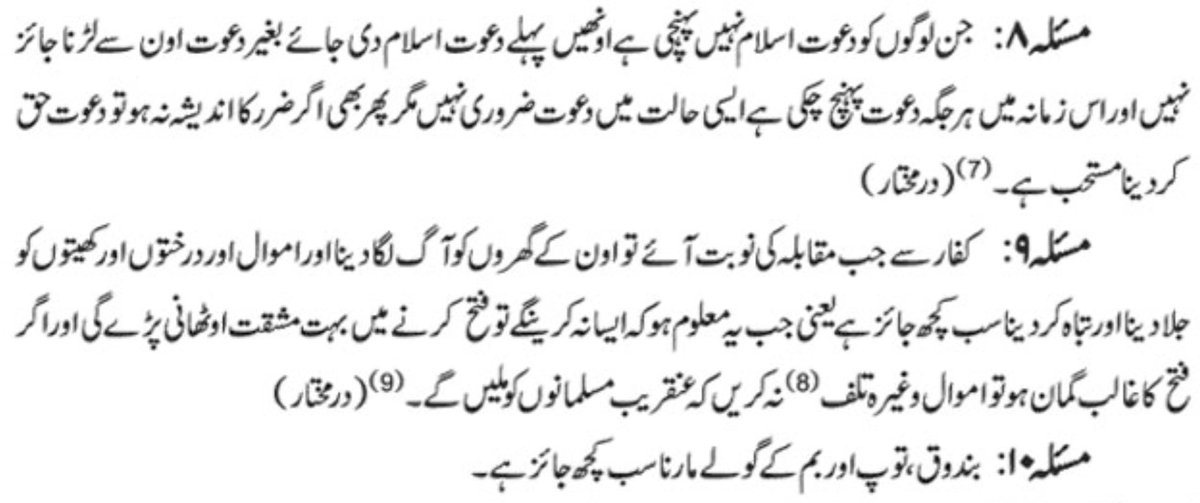OFFENSIVE JIHĀD
The purpose behind Jihād according to the Ahl al-Sunnah is in order to conquer new lands and impose Islām upon them so that the people of those lands have a chance to become Muslim and save their Ākhirah. https://twitter.com/IIlIIIIIllIlIlI/status/1314314699173961729">https://twitter.com/IIlIIIIIl...
The purpose behind Jihād according to the Ahl al-Sunnah is in order to conquer new lands and impose Islām upon them so that the people of those lands have a chance to become Muslim and save their Ākhirah. https://twitter.com/IIlIIIIIllIlIlI/status/1314314699173961729">https://twitter.com/IIlIIIIIl...
Allāh and His Rasūl ﷺ have commanded Muslims to conquer the earth and bring it under the dominance and banner of Islām and establish the worship of Allāh on this entire planet.
This is the belief of Ahl al-Sunnah of the four Madh’habs and the way of the true Sufis.
This is the belief of Ahl al-Sunnah of the four Madh’habs and the way of the true Sufis.
This is established from the Qur’ān, Sunnah, the Salaf, and the later scholars.
Evidence from the Qur’ān:
Allāh táālā states:
“War [against] the people who do not believe in Allāh nor the last day, nor hold that as forbidden which has been forbidden by Allāh and His Rasūl,
Evidence from the Qur’ān:
Allāh táālā states:
“War [against] the people who do not believe in Allāh nor the last day, nor hold that as forbidden which has been forbidden by Allāh and His Rasūl,
and [those that] take not as their religion the religion of truth (Islām) from those who have been given a book – until they pay the Jizyah with their hands, and they’re humiliated.”
[Tawbah, 9:29]
The following verse is one of the last few verses to be revealed.
[Tawbah, 9:29]
The following verse is one of the last few verses to be revealed.
Allāh táālā states:
“O Herald of the Unseen [Nabī]! Fight against the disbelievers and the hypocrites, and be stern with them.”
[Tawbah, 9:73]
“O Herald of the Unseen [Nabī]! Fight against the disbelievers and the hypocrites, and be stern with them.”
[Tawbah, 9:73]
Imām Ĥusayn ibn Masúūd al-Baghawī al-Shāfiýī [d. 516 AH / 1122 CE] writes in his Tafsīr Máālim al-Tanzīl under this verse:
“And Áţā’a [ibn Abī Rabāĥ] said: ‘This verse abrogates all things [previously ordained] in terms of forgiveness and forbearance [towards them].’”
“And Áţā’a [ibn Abī Rabāĥ] said: ‘This verse abrogates all things [previously ordained] in terms of forgiveness and forbearance [towards them].’”
The exact same thing is also mentioned in many other books of Tafsīr and Aĥkām al-Qur’ān.
Áţā’a ibn Abī Rabāĥ [25 AH - 114 AH / 646-732 CE] was one of the teachers of Imām Abū Ĥanīfah, about whom he said:
“I have not seen any...superior to Áţā’a ibn Abī Rabāĥ.”
Áţā’a ibn Abī Rabāĥ [25 AH - 114 AH / 646-732 CE] was one of the teachers of Imām Abū Ĥanīfah, about whom he said:
“I have not seen any...superior to Áţā’a ibn Abī Rabāĥ.”
It is true that during the Makkan period, when the proofs and evidences for his call were in the midst of being established, Allāh commanded His Rasūl ﷺ and believers to pardon and overlook until His command would be revealed.
For example:
“So forgive and forebear, until Allāh brings His command.”
[Baqarah, 2:109]
Allāh’s further command, as mentioned in that and similar verses of the Makkan period, is revealed in this verse and other verses of war commanding no forbearance and forgiveness.
“So forgive and forebear, until Allāh brings His command.”
[Baqarah, 2:109]
Allāh’s further command, as mentioned in that and similar verses of the Makkan period, is revealed in this verse and other verses of war commanding no forbearance and forgiveness.
All the forgiveness, forbearance and clemency to the Kāfirs is abrogated with this verse.
Evidence from the Sunnah:
RasūlAllāh ﷺ said:
“I have been commanded to fight people until they testify that there is no god but Allāh and believe in me and what I have brought.
Evidence from the Sunnah:
RasūlAllāh ﷺ said:
“I have been commanded to fight people until they testify that there is no god but Allāh and believe in me and what I have brought.
When they do so then their blood and property are protected from me except for the right [of Islamic law], and their reckoning is up to Allāh.”
[Muslim]
He ﷺ also said:
“I have been sent ahead of the Hour with the sword so that Allāh will be worshipped alone,
[Muslim]
He ﷺ also said:
“I have been sent ahead of the Hour with the sword so that Allāh will be worshipped alone,
and my provision has been placed in the shade of my spear, and humiliation has been decreed for those who go against my command, and whoever imitates a people is one of them.”
[Aĥmad]
[Aĥmad]
Sayyidunā Buraydah said:
“When RasūlAllāh ﷺ appointed a commander to lead an army or a raiding party, he would advise him to fear Allāh with regard to himself and the Muslims with him, then he said: ‘Fight in the name of Allāh and for the sake of Allāh.
“When RasūlAllāh ﷺ appointed a commander to lead an army or a raiding party, he would advise him to fear Allāh with regard to himself and the Muslims with him, then he said: ‘Fight in the name of Allāh and for the sake of Allāh.
Fight those who disbelieve in Allāh; fight but do not steal from the war booty, betray, or mutilate and do not kill children. If you meet your enemy of the Mushrikīn, call them to three things, and whichever one of them they respond to, accept that from them and leave them alone.
Call them to Islām and if they respond, accept that from them and leave them alone. Then invite them to migrate from their lands to the land of the Muhājirīn and inform them that, if they do so, they shall have all the privileges and obligations of the Muhājirīn.
If they refuse to migrate, tell them that they will have the status of Bedouin Muslims and will be subjected to the Commands of Allāh like other Muslims, but they will not get any share from the spoils of war or Fay except when they actually fight with the Muslims
(against the disbelievers). If they refuse to accept Islām, demand from them the Jizyah. If they agree to pay, accept it from them and hold off your hands. If they refuse then seek Allāh’s help and fight them.’”
[Muslim]
[Muslim]
Here we see that RasūlAllāh ﷺ told his commanders to call the Kāfirs to accept Islām, if they refused then to pay the Jizyah with humility, and if they refused that then to fight.
We shall see that this continued to be followed after the passing of RasūlAllāh ﷺ.
We shall see that this continued to be followed after the passing of RasūlAllāh ﷺ.
Evidence from the Salaf:
Jubayr ibn Ĥayyah said:
“Úmar sent people to all the regions to fight the Mushrikīn… so Úmar recruited us and appointed Númān ibn Muqarrin to lead us. When we were in the land of the enemy,
Jubayr ibn Ĥayyah said:
“Úmar sent people to all the regions to fight the Mushrikīn… so Úmar recruited us and appointed Númān ibn Muqarrin to lead us. When we were in the land of the enemy,
the representative of Chosroes came out to us with forty thousand troops. An interpreter stood up and said: ‘Let one of you speak to me.’ Mughīrah said: ‘Ask whatever you want.’ He asked, ‘Who are you?’ He (Mughīrah) said: ‘We are some people from among the Arabs.
We used to lead a harsh and miserable life, sucking on animal skins and date stones because of hunger, wearing clothes made of camel and goat hair, worshipping trees and rocks. While we were in this state, the Lord of the heavens and the earth,
exalted be His name and glorified be His greatness, sent to us a Nabī from amongst ourselves, whose father and mother we know. Our Nabī, the Rasūl of our Lord ﷺ, commanded us to fight you until you worship Allāh alone or pay the Jizyah.
Our Nabī told us the message from our Lord, that whoever among us is killed will go to Paradise to enjoy delights such as no one has ever seen, and whoever among us is left will become your master.’”
Thus we see that the companions and the Salaf understood that the command to fight the Kāfirs is the final command from RasūlAllāh ﷺ until they except Islām or pay the Jizyah.
They did not say we are here for self-defence, or for any other reason except for this.
They did not say we are here for self-defence, or for any other reason except for this.
Sayyidunā Ribýī ibn Áāmir was asked by Rustam, the commander of the Persian, “What has brought you here?”
To which he replied, “Allāh has sent us and Allāh has brought us here to bring forth whomsoever He wills from worship of people to worship of Allāh,
To which he replied, “Allāh has sent us and Allāh has brought us here to bring forth whomsoever He wills from worship of people to worship of Allāh,
and from the poverty of this world into affluence, and from the oppression of the (false) religions to the justice of Islām. He has sent us with His religion to His creatures in order to call them towards it. Whoever accepts that from us, we accept that from him and leave him.
We shall leave him on his land to rule it without us, and whoever refuses, we shall fight him, until we fulfil the promise of Allāh.”
He asked, “And what is the promise of Allāh?”
He replied, “Paradise for him who dies whilst fighting those who have refused (to accept Islām)
He asked, “And what is the promise of Allāh?”
He replied, “Paradise for him who dies whilst fighting those who have refused (to accept Islām)
and victory for him who survives.”
Thus Rustam said, “I have heard your speech. Are you willing to delay this matter until we consider it and you consider it?”
He replied, “Yes, how long would you like? One day or two days?”
Thus Rustam said, “I have heard your speech. Are you willing to delay this matter until we consider it and you consider it?”
He replied, “Yes, how long would you like? One day or two days?”
He said, “No, until we write to our men of judgement and the leaders of our people.”
Thus he stated, “Indeed, from what RasūlAllāh ﷺ established for us and what was acted upon by our leaders is that we should not listen to the enemy,
Thus he stated, “Indeed, from what RasūlAllāh ﷺ established for us and what was acted upon by our leaders is that we should not listen to the enemy,
nor delay the fight with them for more than three days. We shall go back and leave you for three days. Look into your affair and the affair of your people, and choose one of three options after this period. Choose Islām, and we shall leave you and your land;
or choose the Jizyah, we shall accept it and refrain from fighting you. If you do not need our help, we shall leave you alone; and if you need it, we shall protect you. Otherwise, it will be war on the fourth day.
We shall not attack you between now and the fourth day unless you attack us. You have my guarantee on behalf of my companions and on behalf of all those (Muslims) whom you see.”
[Tārīkh al-Ţabarī]
[Tārīkh al-Ţabarī]
When Sayyidunā Úqbah ibn Nāfí [1-63 AH / 622-683 CE] reached Tangiers, he rode his horse into the water until the water was up to its chest, then he said:
“O Allāh, bear witness that I have done my utmost,
“O Allāh, bear witness that I have done my utmost,
and were it not for this sea I would have travelled throughout the land fighting those who disbelieve in You, until none is worshipped except You.”
[Riyāđ al-Nufūs]
This shows the belief and understanding of the companions and the Salaf when it came to Jihād.
[Riyāđ al-Nufūs]
This shows the belief and understanding of the companions and the Salaf when it came to Jihād.
Sayyidunā Abū Hurayrah said regarding the verse, “You are the best among all the nations that were raised among mankind.” [Aāl Ímrān, 3:110]:
“The best of peoples for the people, as you bring them with chains on their necks till they embrace Islām.”
[Bukhārī]
“The best of peoples for the people, as you bring them with chains on their necks till they embrace Islām.”
[Bukhārī]
This understanding was taken by Sayyidunā Abū Hurayrah from RasūlAllāh ﷺ who said:
“Allāh is delighted at a people who enter Paradise in chains.”
[Bukhārī]
“Allāh is delighted at a people who enter Paradise in chains.”
[Bukhārī]
Imām Ibn al-Jawzī al-Ĥanbalī [d. 597 AH / 1201 CE] said:
“It’s meaning is that they are captured (in war) and chained as prisoners, but when they come to know the truth of Islām, they enter it willingly and will thus enter Paradise.”
[Fat’ĥ al-Bārī]
“It’s meaning is that they are captured (in war) and chained as prisoners, but when they come to know the truth of Islām, they enter it willingly and will thus enter Paradise.”
[Fat’ĥ al-Bārī]
Therefore it is established that the main purpose behind Jihād is for people to enter Islām and has been the most effective way, as due to it the inhabitants of many lands became Muslims and those lands are still vastly Muslim until this day.
Evidence from the later scholars:
Ĥujjat al-Islām Abū Ĥāmid Muĥammad ibn Muĥammad al-Ţūsī al-Shāfiýī al-Ghazālī [450-505 AH / 1058-1111 CE] writes in the Mustaşfā:
“As we know with certainty that the Nabī ﷺ commanded to [establishing] the prayers and zakāh,
Ĥujjat al-Islām Abū Ĥāmid Muĥammad ibn Muĥammad al-Ţūsī al-Shāfiýī al-Ghazālī [450-505 AH / 1058-1111 CE] writes in the Mustaşfā:
“As we know with certainty that the Nabī ﷺ commanded to [establishing] the prayers and zakāh,
and it is also well known with certainty that he ﷺ commanded the Jews and Christians to believe in him, and follow him, and censured them for their obstinacy upon their beliefs, and because of this, he ﷺ fought against all of them,
and he exposed their defiance and plots to murder [him].
And he knew full well that the defiant ones were less and the majority were those who believed in the religion of their forefathers out of blind following and they couldn’t even see the miracles of the Rasūl ﷺ,
And he knew full well that the defiant ones were less and the majority were those who believed in the religion of their forefathers out of blind following and they couldn’t even see the miracles of the Rasūl ﷺ,
and his truthfulness [due to their blind following], and the verses in the Qur’ān proving this are numerous, like His sayings, ‘That is the supposition of those who disbelieve, so woe unto those who disbelieve’
and, ‘And that was your assumption that you had assumed about your Lord’ and, ‘They are but assuming’ and, ‘and [they] think they are on to something’ and, ‘in their hearts is a disease’; summarily, Allāh and His Rasūl ﷺ
have censured the denying Kuffār in the Book [Qur’ān] & Sunnah in numerous places.
As for his [Jāĥiż’s] saying that how are they accountable for that which they can’t bear [by way of accepting the commandments to follow the Rasūl ﷺ and accept the new laws],
As for his [Jāĥiż’s] saying that how are they accountable for that which they can’t bear [by way of accepting the commandments to follow the Rasūl ﷺ and accept the new laws],
we say that we know with confirmed certainty that He [Allāh] has made them accountable. As for what they can and can’t bear, we shall look at it: so in this regards Allāh has granted them capability [to accept the commandments to follow the Rasūl ﷺ]
by way of bestowing upon them reasoning and establishing proofs [for them], and sent Messengers aided by miracles – those who stimulate the minds and activate the sight of reasoning, so much so that after [hearing of] the Messengers, no one can ask Allāh for anymore proof
[i.e. firm evidence is established upon mankind to know Allāh as The Only True God & worship Him – by the arrival of His Messengers].”
Mujaddid Alf Thānī Imām Rabbānī Aĥmad ibn Ábd al-Aĥad al-Fārūqī al-Sirhindī al-Naqshbandī al-Ĥanafī [971-1034 AH / 1564-1624] writes in one of his Maktūbāt:
“Ĥaqq Subĥānahū wa táālā tells His beloved, on him be exaltation and greetings, as such:
“Ĥaqq Subĥānahū wa táālā tells His beloved, on him be exaltation and greetings, as such:
‘O Nabī, wage Jihād against the disbelievers and hypocrites and be harsh with them.’
Allāh has commanded His Rasūl, whom He has blessed with Khuluq al-Áżīm, the exalted standard of character, to wage Jihād against the Kuffār and to be tough with them.
Allāh has commanded His Rasūl, whom He has blessed with Khuluq al-Áżīm, the exalted standard of character, to wage Jihād against the Kuffār and to be tough with them.
Then from this we know that harshness to Kuffār is also a part of Khuluq al-Áżīm.”
Here we see that famous Sufi Masters also had this understanding and belief, and were not at all similar to the pseudo-Sufis of today who deny Jihād and harshness to Kuffār.
Here we see that famous Sufi Masters also had this understanding and belief, and were not at all similar to the pseudo-Sufis of today who deny Jihād and harshness to Kuffār.
He writes in another letter:
“Allāh táālā says:
‘O Nabī, wage Jihād against the disbelievers and hypocrites and be harsh with them.’
Launching Jihād against the Kuffār and administering harshness on them is from the necessities of the Dīn.
“Allāh táālā says:
‘O Nabī, wage Jihād against the disbelievers and hypocrites and be harsh with them.’
Launching Jihād against the Kuffār and administering harshness on them is from the necessities of the Dīn.
The remaining conventions of Kufr that had not manifested in the previous era – due to this era’s king of Islam’s (in India) disconnect with the [evils of the] Ahl al-Kufr – have hit hard on the hearts of Muslims.
It is compulsory for Muslims to inform the king of Islām of the evils of those conventions of these infidels; and strive to abdicate them (the conventions of Kufr). Maybe the king is not aware of the evils of these remaining conventions.
And if you consider it feasible based on the times, then inform some Úlamā’a of Ahl al-Islām so that they come and show the evils of the Ahl al-Kufr. Because for the propagation of the commands of the Sharīáh, no paranormal events of manifestations of Karāmāt, are required.
On the Day of Judgment, no excuses shall be heard that one did not propagate the commands of the Sharīáh due to a lack of Taşarruf (Taşarruf refers to mystical deportations of the Sufis).”
The Imām says that the job of Muslims is to teach and remind their leaders if they fall into heedlessness. It is our job to help our leaders and heads of states, and when they are heedless in implementing the commands of the Sharīáh they need to be shown such commands –
this is the greatest help we can offer them.
Riot and revolting against them is not the way of Islām. Even if the Muslim rulers of our times do not charge the Jizyah from Kāfirs, or they hire Kāfirs as advisors in governmental positions of Muslim states (this is Ĥarām),
Riot and revolting against them is not the way of Islām. Even if the Muslim rulers of our times do not charge the Jizyah from Kāfirs, or they hire Kāfirs as advisors in governmental positions of Muslim states (this is Ĥarām),
or form treaties and alliances with Kāfir countries that hurt Muslims, or have given up all forms of offensive and defensive Jihād, we cannot revolt against them as long as they do not restrict our practice of Islām.
As the noble Imām says,
As the noble Imām says,
this job of teaching and informing the Islamic heads of states, should be carried out by scholars and their close aides. The common people can remind the scholars to wake up and fulfil their duties to the commands of Allāh.
Ĥujjat al-Islām Abū Ĥāmid Muĥammad ibn Muĥammad al-Ţūsī al-Shāfiýī al-Ghazālī [450-505 AH / 1058-1111 CE] writes in Iqtişād fi’l Iítiqād:
“The second group of people: a party that inclines away from the true belief, such as the Kāfirs and deviant innovators.
“The second group of people: a party that inclines away from the true belief, such as the Kāfirs and deviant innovators.
The averse and vulgar are among these; those of weak minds that are stuck in blind imitation and are argumentative based on falsehood from the beginning of their lives until old age. Nothing works on this group except the whip and the sword.
Most of the Kāfirs became Muslims under the shadow of the swords, because Allāh does by the sword and the spear what He does not do by proofs and words. From this, if you read history, you will not read about any battle between Muslims and Kāfirs without there being some of them
that become Muslims, and you will not find a debate that did not increase anything but [antagonistic] insistence and stubbornness. Do not think that this that we have mentioned reduces the status of the mind and its proofs. Rather, the enlightenment of the mind is a grace that
Allāh does not grant anyone except a few of those who obey Him. The overwhelming state of creation is shortcoming and negligence, however, and due to their shortcoming, they do not sense the proofs of the mind, just as the sight of bats does not sense the light of the sun.
Such people are so hurt by these sciences [Kalām] as a dung beetle is hurt by the smell of a rose. And citing their example, Imam Shāfiýī رحمه الله said [a couplet]: He who taught knowledge to senseless ignoramuses, he wasted knowledge; and he who prevented deserving,
reasonable people from learning it, has committed a travesty.”
This refutes the belief propagated by the lying disbelievers pretending to be “Sufis” that Islām was not spread or can not be spread by expanding its influence and domination through conquests by wars and battles.
This refutes the belief propagated by the lying disbelievers pretending to be “Sufis” that Islām was not spread or can not be spread by expanding its influence and domination through conquests by wars and battles.
Imām Abu’l Ĥusayn Aĥmad al-Qudūrī al-Ĥanafī [362-428 AH / 973-1037 CE] writes in his Mukhtaşar:
“Jihād is a collective obligation; when a group of the people establish it, it lapses from the rest, but if none of them establish it,
“Jihād is a collective obligation; when a group of the people establish it, it lapses from the rest, but if none of them establish it,
all of the people are guilty of wrongdoing by its omission.
Fighting Kāfirs is obligatory, even it they do not initiate it against us.”
He further writes
“When Muslims enter Dār al-Ĥarb and they lay siege to a city or to a fort, they invite [the inhabitants] to Islam.
Fighting Kāfirs is obligatory, even it they do not initiate it against us.”
He further writes
“When Muslims enter Dār al-Ĥarb and they lay siege to a city or to a fort, they invite [the inhabitants] to Islam.
If [the inhabitants] accept them, [then] [the Muslims] desist from fighting them, but if they decline, [the Muslims] call them to pay Jizyah.
If they give it (Jizyah), then they have [as a legal right] whatever the Muslims have, and [the legal duties]
If they give it (Jizyah), then they have [as a legal right] whatever the Muslims have, and [the legal duties]
due on them are whatever are due on [the Muslims].
It is not permitted to fight those whom the invitation of Islām has not reached, except after [the Muslims] have invited them [to Islām].
It is recommended to invite those whom the invitation of Islam has [already] reached
It is not permitted to fight those whom the invitation of Islām has not reached, except after [the Muslims] have invited them [to Islām].
It is recommended to invite those whom the invitation of Islam has [already] reached
[before fighting them], but that is not obligatory.
If they refuse, [the Muslims] should seek the aid of Allāh táālā against them and wage war on them. They should fire catapults at them and burn [their buildings and strategic positions]. They should unleash water against them
If they refuse, [the Muslims] should seek the aid of Allāh táālā against them and wage war on them. They should fire catapults at them and burn [their buildings and strategic positions]. They should unleash water against them
[flood their forts if possible] and cut down their trees and destroy their crops.
There is no objection in shooting them [with arrows], even though there may be Muslim prisoners or traders amongst them.
If they shield themselves with children of the Muslims, or with prisoners,
There is no objection in shooting them [with arrows], even though there may be Muslim prisoners or traders amongst them.
If they shield themselves with children of the Muslims, or with prisoners,
[the Muslims] should not cease shooting at them [with arrows]. With the shooting [of arrows, etc.] they target Kāfirs, but not the Muslims.”
Şadru’sh Sharīáh Mawlānā Amjad Álī al-Ĥanafī al-Qādirī al-Aáżamī [1293-1367 AH / 1876-1948 CE] writes in Bahār e Sharīát:
“It is necessary upon Musalmāns to call the Kāfirs to Dīn-e-Islām. If they accept Dīn-e-Ĥaqq then this is good fortune. It has been said in a Ĥadīth,
“It is necessary upon Musalmāns to call the Kāfirs to Dīn-e-Islām. If they accept Dīn-e-Ĥaqq then this is good fortune. It has been said in a Ĥadīth,
‘If Allāh táālā bestows guidance to one person due to you, then this is better than that which the Sun has risen upon.’
Meaning, that you receive everything from the places the Sun rises, better than this is that due to you someone is guided,
Meaning, that you receive everything from the places the Sun rises, better than this is that due to you someone is guided,
and if the Kāfirs do not accept Dīn-e-Ĥaqq then the Badshāh-e-Islām should impose the Jizyah upon them, that they should continue paying and such a Kāfir is called a Dhimmī, and those who also refuse this, then the command is to wage Jihād.”
He further writes:
“Those people to whom the Dáwat-e-Islām has not reached, they should firstly be given the Dáwat-e-Islām. To fight them without giving them Dáwat is not permissible, and in this age the Dáwat has reached all places.
“Those people to whom the Dáwat-e-Islām has not reached, they should firstly be given the Dáwat-e-Islām. To fight them without giving them Dáwat is not permissible, and in this age the Dáwat has reached all places.
In such a situation Dáwat is not necessary but even then, if there is no fear of harm, then to give them Dáwat-e-Ĥaqq is Mustaĥab.
When the time comes to face the Kuffār, then to set fire to their houses and to burn and destroy their wealth, trees and fields is all permissible.
When the time comes to face the Kuffār, then to set fire to their houses and to burn and destroy their wealth, trees and fields is all permissible.
Meaning, when it is known that if they do not do so then they will have to bear much hardship in being victorious, and if there is overwhelming assumption of victory then they should not destroy wealth etc, as it will soon come into the hands of the Musalmāns.
To use guns, canons and bombs are all permissible.
If the Kāfirs place a few Musalmāns, so that the bullets etc, hit them and that they will remain protected behind them, even then it is not permissible for us to refrain.
If the Kāfirs place a few Musalmāns, so that the bullets etc, hit them and that they will remain protected behind them, even then it is not permissible for us to refrain.
They should shoot the bullet and make the intention to hit the Kāfirs. If any Musalmān dies from a bullet of the Musalmāns, even then there is no Kaffārah etc, that is compulsory when the one shooting the bullet had the intention of shooting at a Kāfir.”
It is important to understand that Jihād by war is to be launched by the heads of Islamic states in order to conquer new lands and impose Islām upon them so that the people of those lands have a chance to become Muslim and save their Ākhirah.
Individuals and groups are not permitted to take such actions unilaterally, especially when they know that they certainly do not hold any strategic or tactical advantages and will endanger the safety of life and property, honour, and freedom to practice Islām of the Muslims
living in a Kāfir land.
The ways of the foolish Khawārij are not endorsed by Islām. The right way to launch Jihād against Kāfirs is to teach and inform Muslim rulers to launch Jihād officially and formally.
The ways of the foolish Khawārij are not endorsed by Islām. The right way to launch Jihād against Kāfirs is to teach and inform Muslim rulers to launch Jihād officially and formally.
Moreover, Muslims must not breach and must honour any such treaty that they enter into with the Kuffār, if the clauses and conditions of such a treaty are permitted by Islām.
https://twitter.com/IbneKhan01/status/1315628590193573888">https://twitter.com/IbneKhan0...
https://mobile.twitter.com/IbneKhan01/status/1361456881705897984">https://mobile.twitter.com/IbneKhan0...
https://twitter.com/IbneKhan01/status/1374926088367931394?s=19">https://twitter.com/IbneKhan0...
https://mobile.twitter.com/IbneKhan01/status/1271081108743106561">https://mobile.twitter.com/IbneKhan0...
https://twitter.com/IbneKhan01/status/1388881730363351050?s=19">https://twitter.com/IbneKhan0...

 Read on Twitter
Read on Twitter
![This is established from the Qur’ān, Sunnah, the Salaf, and the later scholars.Evidence from the Qur’ān:Allāh táālā states:“War [against] the people who do not believe in Allāh nor the last day, nor hold that as forbidden which has been forbidden by Allāh and His Rasūl, This is established from the Qur’ān, Sunnah, the Salaf, and the later scholars.Evidence from the Qur’ān:Allāh táālā states:“War [against] the people who do not believe in Allāh nor the last day, nor hold that as forbidden which has been forbidden by Allāh and His Rasūl,](https://pbs.twimg.com/media/Ej4mmTBWAAI_lNQ.jpg)
![Allāh táālā states:“O Herald of the Unseen [Nabī]! Fight against the disbelievers and the hypocrites, and be stern with them.”[Tawbah, 9:73] Allāh táālā states:“O Herald of the Unseen [Nabī]! Fight against the disbelievers and the hypocrites, and be stern with them.”[Tawbah, 9:73]](https://pbs.twimg.com/media/Ej4m0DEWsAA--yI.jpg)
![Imām Ĥusayn ibn Masúūd al-Baghawī al-Shāfiýī [d. 516 AH / 1122 CE] writes in his Tafsīr Máālim al-Tanzīl under this verse:“And Áţā’a [ibn Abī Rabāĥ] said: ‘This verse abrogates all things [previously ordained] in terms of forgiveness and forbearance [towards them].’” Imām Ĥusayn ibn Masúūd al-Baghawī al-Shāfiýī [d. 516 AH / 1122 CE] writes in his Tafsīr Máālim al-Tanzīl under this verse:“And Áţā’a [ibn Abī Rabāĥ] said: ‘This verse abrogates all things [previously ordained] in terms of forgiveness and forbearance [towards them].’”](https://pbs.twimg.com/media/Ej4pd5bWAAAvaRd.jpg)
![Imām Ĥusayn ibn Masúūd al-Baghawī al-Shāfiýī [d. 516 AH / 1122 CE] writes in his Tafsīr Máālim al-Tanzīl under this verse:“And Áţā’a [ibn Abī Rabāĥ] said: ‘This verse abrogates all things [previously ordained] in terms of forgiveness and forbearance [towards them].’” Imām Ĥusayn ibn Masúūd al-Baghawī al-Shāfiýī [d. 516 AH / 1122 CE] writes in his Tafsīr Máālim al-Tanzīl under this verse:“And Áţā’a [ibn Abī Rabāĥ] said: ‘This verse abrogates all things [previously ordained] in terms of forgiveness and forbearance [towards them].’”](https://pbs.twimg.com/media/Ej4pixNWsAEsOjR.png)
![The exact same thing is also mentioned in many other books of Tafsīr and Aĥkām al-Qur’ān.Áţā’a ibn Abī Rabāĥ [25 AH - 114 AH / 646-732 CE] was one of the teachers of Imām Abū Ĥanīfah, about whom he said:“I have not seen any...superior to Áţā’a ibn Abī Rabāĥ.” The exact same thing is also mentioned in many other books of Tafsīr and Aĥkām al-Qur’ān.Áţā’a ibn Abī Rabāĥ [25 AH - 114 AH / 646-732 CE] was one of the teachers of Imām Abū Ĥanīfah, about whom he said:“I have not seen any...superior to Áţā’a ibn Abī Rabāĥ.”](https://pbs.twimg.com/media/Ej4pzGnXcAAfUCM.png)
![For example:“So forgive and forebear, until Allāh brings His command.”[Baqarah, 2:109]Allāh’s further command, as mentioned in that and similar verses of the Makkan period, is revealed in this verse and other verses of war commanding no forbearance and forgiveness. For example:“So forgive and forebear, until Allāh brings His command.”[Baqarah, 2:109]Allāh’s further command, as mentioned in that and similar verses of the Makkan period, is revealed in this verse and other verses of war commanding no forbearance and forgiveness.](https://pbs.twimg.com/media/Ej4qju_X0AAqdo1.jpg)
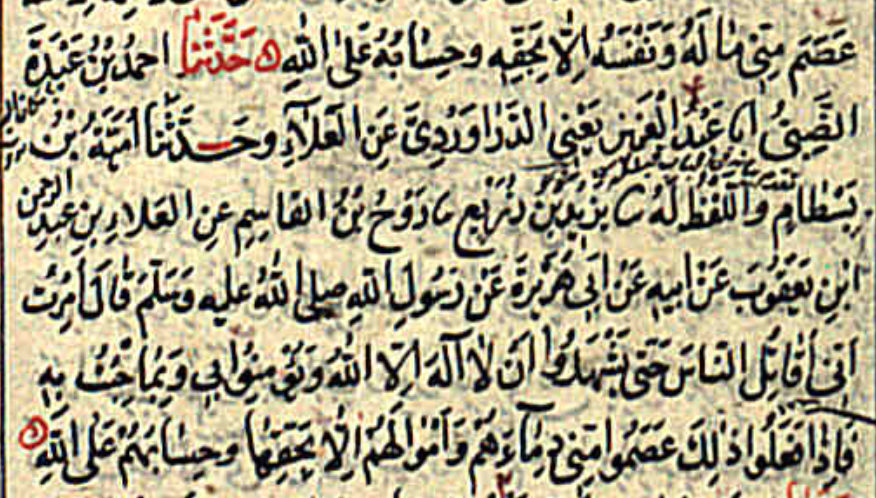
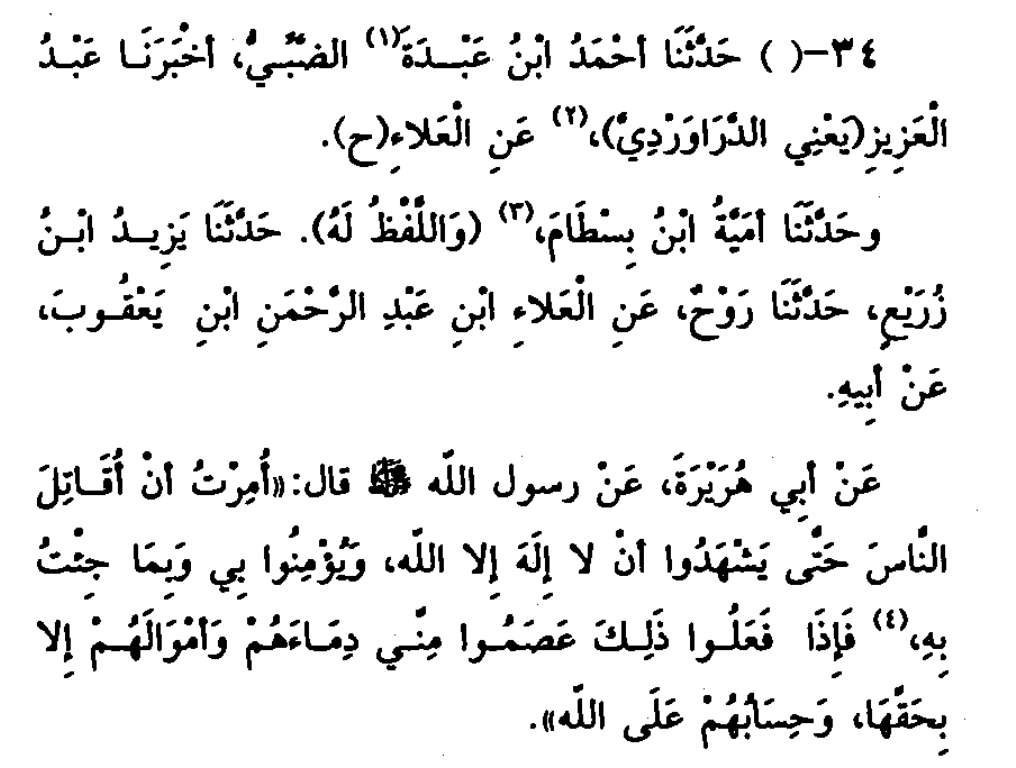
![When they do so then their blood and property are protected from me except for the right [of Islamic law], and their reckoning is up to Allāh.”[Muslim]He ﷺ also said:“I have been sent ahead of the Hour with the sword so that Allāh will be worshipped alone, When they do so then their blood and property are protected from me except for the right [of Islamic law], and their reckoning is up to Allāh.”[Muslim]He ﷺ also said:“I have been sent ahead of the Hour with the sword so that Allāh will be worshipped alone,](https://pbs.twimg.com/media/Ej4yvPfXYAEeup3.png)
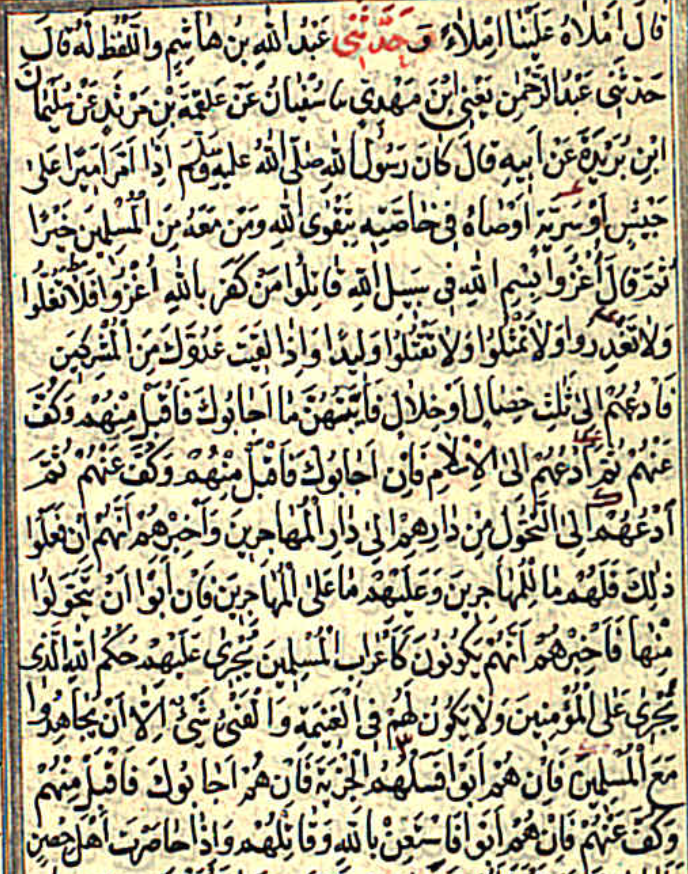
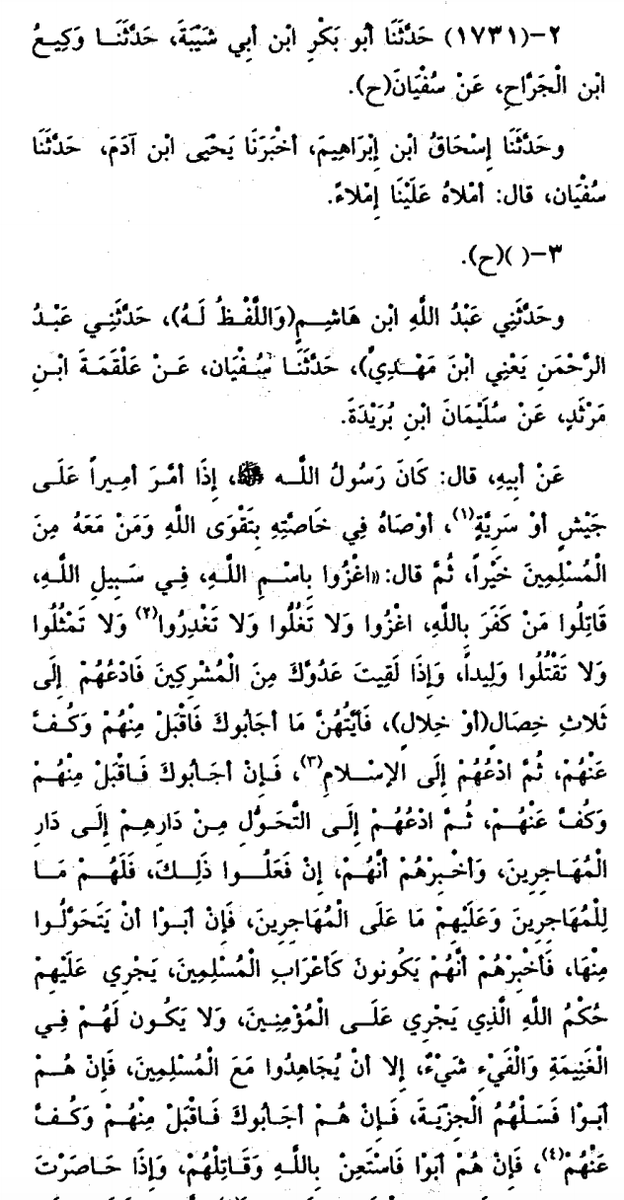
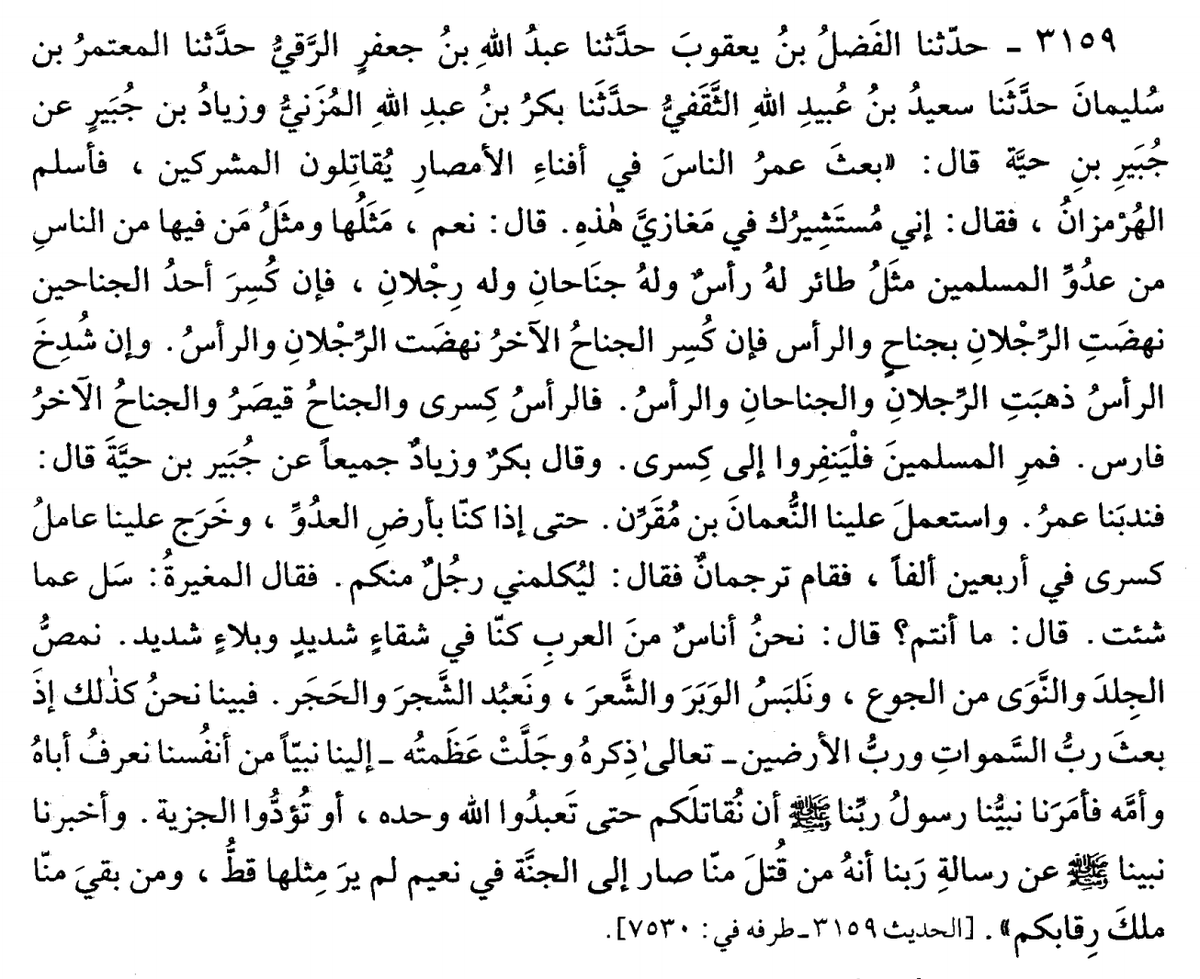
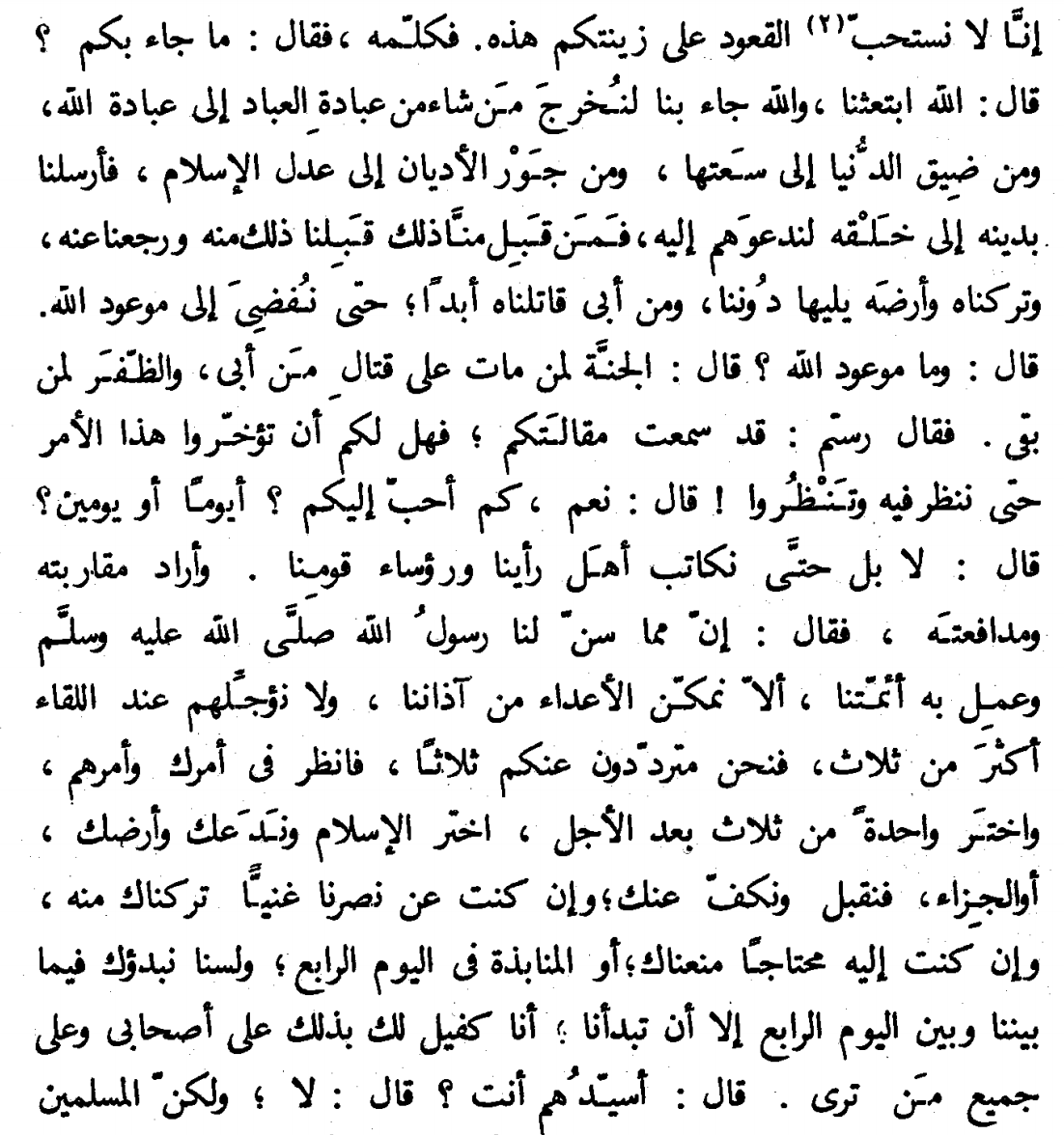
![When Sayyidunā Úqbah ibn Nāfí [1-63 AH / 622-683 CE] reached Tangiers, he rode his horse into the water until the water was up to its chest, then he said: “O Allāh, bear witness that I have done my utmost, When Sayyidunā Úqbah ibn Nāfí [1-63 AH / 622-683 CE] reached Tangiers, he rode his horse into the water until the water was up to its chest, then he said: “O Allāh, bear witness that I have done my utmost,](https://pbs.twimg.com/media/EkDSE4pXYAABq3E.jpg)
![Sayyidunā Abū Hurayrah said regarding the verse, “You are the best among all the nations that were raised among mankind.” [Aāl Ímrān, 3:110]:“The best of peoples for the people, as you bring them with chains on their necks till they embrace Islām.”[Bukhārī] Sayyidunā Abū Hurayrah said regarding the verse, “You are the best among all the nations that were raised among mankind.” [Aāl Ímrān, 3:110]:“The best of peoples for the people, as you bring them with chains on their necks till they embrace Islām.”[Bukhārī]](https://pbs.twimg.com/media/EkDSUofWoAMYY3U.png)
![This understanding was taken by Sayyidunā Abū Hurayrah from RasūlAllāh ﷺ who said:“Allāh is delighted at a people who enter Paradise in chains.”[Bukhārī] This understanding was taken by Sayyidunā Abū Hurayrah from RasūlAllāh ﷺ who said:“Allāh is delighted at a people who enter Paradise in chains.”[Bukhārī]](https://pbs.twimg.com/media/EkDS4_dXcAEz5Jq.png)
![Imām Ibn al-Jawzī al-Ĥanbalī [d. 597 AH / 1201 CE] said:“It’s meaning is that they are captured (in war) and chained as prisoners, but when they come to know the truth of Islām, they enter it willingly and will thus enter Paradise.”[Fat’ĥ al-Bārī] Imām Ibn al-Jawzī al-Ĥanbalī [d. 597 AH / 1201 CE] said:“It’s meaning is that they are captured (in war) and chained as prisoners, but when they come to know the truth of Islām, they enter it willingly and will thus enter Paradise.”[Fat’ĥ al-Bārī]](https://pbs.twimg.com/media/EkDTmyaX0AA3rAk.png)
![Evidence from the later scholars:Ĥujjat al-Islām Abū Ĥāmid Muĥammad ibn Muĥammad al-Ţūsī al-Shāfiýī al-Ghazālī [450-505 AH / 1058-1111 CE] writes in the Mustaşfā:“As we know with certainty that the Nabī ﷺ commanded to [establishing] the prayers and zakāh, Evidence from the later scholars:Ĥujjat al-Islām Abū Ĥāmid Muĥammad ibn Muĥammad al-Ţūsī al-Shāfiýī al-Ghazālī [450-505 AH / 1058-1111 CE] writes in the Mustaşfā:“As we know with certainty that the Nabī ﷺ commanded to [establishing] the prayers and zakāh,](https://pbs.twimg.com/media/EkDTwKLXsAAITlR.png)
![Mujaddid Alf Thānī Imām Rabbānī Aĥmad ibn Ábd al-Aĥad al-Fārūqī al-Sirhindī al-Naqshbandī al-Ĥanafī [971-1034 AH / 1564-1624] writes in one of his Maktūbāt:“Ĥaqq Subĥānahū wa táālā tells His beloved, on him be exaltation and greetings, as such: Mujaddid Alf Thānī Imām Rabbānī Aĥmad ibn Ábd al-Aĥad al-Fārūqī al-Sirhindī al-Naqshbandī al-Ĥanafī [971-1034 AH / 1564-1624] writes in one of his Maktūbāt:“Ĥaqq Subĥānahū wa táālā tells His beloved, on him be exaltation and greetings, as such:](https://pbs.twimg.com/media/EkDUW7LXYAAlUZY.jpg)
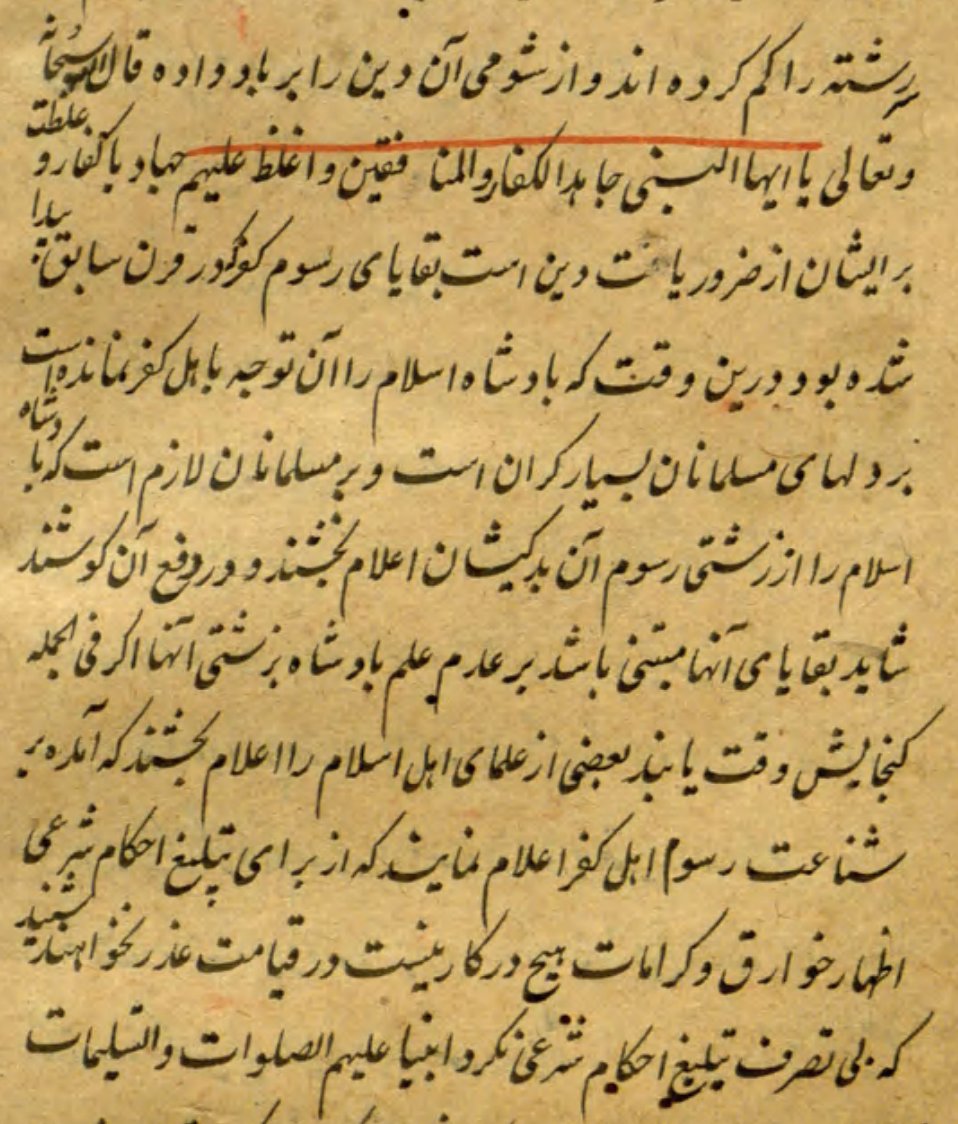
![Ĥujjat al-Islām Abū Ĥāmid Muĥammad ibn Muĥammad al-Ţūsī al-Shāfiýī al-Ghazālī [450-505 AH / 1058-1111 CE] writes in Iqtişād fi’l Iítiqād:“The second group of people: a party that inclines away from the true belief, such as the Kāfirs and deviant innovators. Ĥujjat al-Islām Abū Ĥāmid Muĥammad ibn Muĥammad al-Ţūsī al-Shāfiýī al-Ghazālī [450-505 AH / 1058-1111 CE] writes in Iqtişād fi’l Iítiqād:“The second group of people: a party that inclines away from the true belief, such as the Kāfirs and deviant innovators.](https://pbs.twimg.com/media/EkDk83xWAAcvI_M.jpg)
![Ĥujjat al-Islām Abū Ĥāmid Muĥammad ibn Muĥammad al-Ţūsī al-Shāfiýī al-Ghazālī [450-505 AH / 1058-1111 CE] writes in Iqtişād fi’l Iítiqād:“The second group of people: a party that inclines away from the true belief, such as the Kāfirs and deviant innovators. Ĥujjat al-Islām Abū Ĥāmid Muĥammad ibn Muĥammad al-Ţūsī al-Shāfiýī al-Ghazālī [450-505 AH / 1058-1111 CE] writes in Iqtişād fi’l Iítiqād:“The second group of people: a party that inclines away from the true belief, such as the Kāfirs and deviant innovators.](https://pbs.twimg.com/media/EkDk-eHXYAA6Ihn.jpg)
![Imām Abu’l Ĥusayn Aĥmad al-Qudūrī al-Ĥanafī [362-428 AH / 973-1037 CE] writes in his Mukhtaşar:“Jihād is a collective obligation; when a group of the people establish it, it lapses from the rest, but if none of them establish it, Imām Abu’l Ĥusayn Aĥmad al-Qudūrī al-Ĥanafī [362-428 AH / 973-1037 CE] writes in his Mukhtaşar:“Jihād is a collective obligation; when a group of the people establish it, it lapses from the rest, but if none of them establish it,](https://pbs.twimg.com/media/EkD12Q2XYAIssgL.png)
![Imām Abu’l Ĥusayn Aĥmad al-Qudūrī al-Ĥanafī [362-428 AH / 973-1037 CE] writes in his Mukhtaşar:“Jihād is a collective obligation; when a group of the people establish it, it lapses from the rest, but if none of them establish it, Imām Abu’l Ĥusayn Aĥmad al-Qudūrī al-Ĥanafī [362-428 AH / 973-1037 CE] writes in his Mukhtaşar:“Jihād is a collective obligation; when a group of the people establish it, it lapses from the rest, but if none of them establish it,](https://pbs.twimg.com/media/EkD2AoPXsAIaHEI.png)
![all of the people are guilty of wrongdoing by its omission.Fighting Kāfirs is obligatory, even it they do not initiate it against us.”He further writes“When Muslims enter Dār al-Ĥarb and they lay siege to a city or to a fort, they invite [the inhabitants] to Islam. all of the people are guilty of wrongdoing by its omission.Fighting Kāfirs is obligatory, even it they do not initiate it against us.”He further writes“When Muslims enter Dār al-Ĥarb and they lay siege to a city or to a fort, they invite [the inhabitants] to Islam.](https://pbs.twimg.com/media/EkD2VwRX0AIoS-2.jpg)
![all of the people are guilty of wrongdoing by its omission.Fighting Kāfirs is obligatory, even it they do not initiate it against us.”He further writes“When Muslims enter Dār al-Ĥarb and they lay siege to a city or to a fort, they invite [the inhabitants] to Islam. all of the people are guilty of wrongdoing by its omission.Fighting Kāfirs is obligatory, even it they do not initiate it against us.”He further writes“When Muslims enter Dār al-Ĥarb and they lay siege to a city or to a fort, they invite [the inhabitants] to Islam.](https://pbs.twimg.com/media/EkD2bmMX0AIrg6F.png)
![Şadru’sh Sharīáh Mawlānā Amjad Álī al-Ĥanafī al-Qādirī al-Aáżamī [1293-1367 AH / 1876-1948 CE] writes in Bahār e Sharīát:“It is necessary upon Musalmāns to call the Kāfirs to Dīn-e-Islām. If they accept Dīn-e-Ĥaqq then this is good fortune. It has been said in a Ĥadīth, Şadru’sh Sharīáh Mawlānā Amjad Álī al-Ĥanafī al-Qādirī al-Aáżamī [1293-1367 AH / 1876-1948 CE] writes in Bahār e Sharīát:“It is necessary upon Musalmāns to call the Kāfirs to Dīn-e-Islām. If they accept Dīn-e-Ĥaqq then this is good fortune. It has been said in a Ĥadīth,](https://pbs.twimg.com/media/EkFKLwSWsAAviZz.jpg)
